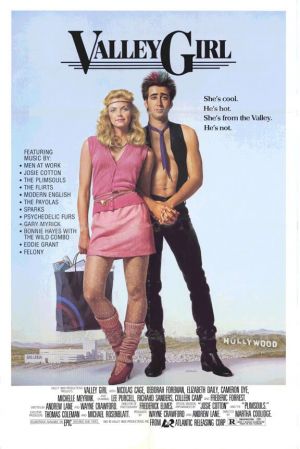
VALLEY GIRL
US, 1983, 98 minutes, Colour.
Nicolas Cage, Deborah Foreman, Frederic Forrest, Colleen Camp.
Directed by Martha Coolidge.
Valley Girl is one of the many youth-oriented films from America during the early '80s. Many of them were sex-focused - for drive in audiences or for adolescent girls to giggle and gape at (Zapped, My Tutor, Private School).
Films with a little more substance and insight included Tijuana (released as Losin' It) and Valley Girl. Directed by documentary Martha Coolidge, the film echoes the documentary style so faithfully that the behaviour and language of the young people in the film seems almost incomprehensible to those who do not live in the San Fernando Valley. It is very much a film for adolescent audiences in the adolescent style. (A compensation for the adults is the casting of Frederic Forrest and Colleen Camp as the heroine's parents - and
their memories of their hippie times in the late '60s.)
1. A film for teenagers? In the adolescent style? A piece of Americana - a mirror of the early 180s? Entertainment? A critique of the San Fernando Valley and American lifestyles? A blend of the exploitive and the serious?
2. Production values: Los Angeles, the Valley, homes, school, the streets, clubs, parties, shops? Glossy style? An atmosphere of affluence? The use of contemporary songs and sounds - the lyrics and their social comment? The audio-visual style of television and video clips?
3. The screenplay and its being geared towards the younger audiences? on their wavelength? The feel of the characters and their situations? Capturing the mood? Reflection and critique? Appearances and reality? Adolescent preoccupations? The focus on sex? Values? How fair a picture of adolescents? Their experience? Friends, school? Decisions and the '80s? Impact for adolescents? Adults?
4. The focus on Julie? Susie and her mother and the rivalry? Parties, attitudes towards sex? Stacey and her snobbery? Loryn and Tom and the focus on sex? Types? Comparisons? Boys and the expectations?
5. Julie in herself, her relationship to her parents, work, Randy, the new world beyond the Valley, falling in love, Tom, clashes, decisions and the ending?
6. Randy: the beach, the party, the punch, the toilet sequence, outing, changing, a different world, rejection, comic reappearance? The final dramatics - and melodramatics of the ending?
7. Tom, the friends and their standards?
8. The spoof portrait of the parents - their past hippie values, the transition from the '60s to the '80s? From being in the '20s to the '40s? Coping with their children?
9. The particular details of the way of life - home, school, shopping, parties?
10. The importance of self-discovery, values, relationships? In the affluent style of the San Fernando Valley?